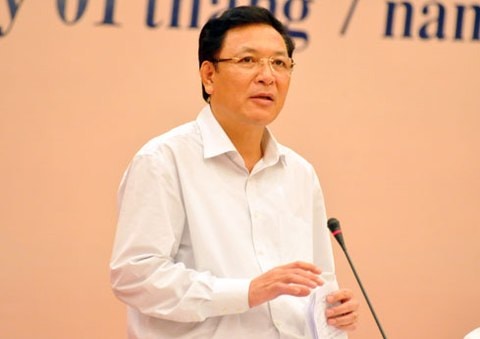Minister of Education: Vietnam's way of teaching foreign languages is like no other
Opening the question-and-answer session on the morning of June 11, Minister of Education and Training Pham Vu Luan said that the Ministry received 19 questions, one of which was related to the Ministry of Labor. The 18 questions focused on 7 groups of issues: training, enrollment, unemployed students, settlement of university education budget, ethics and lifestyle education, high school graduation exams, registration for History, and curriculum and textbook innovation. The Ministry responded in writing to 11 delegates.
 |
| Minister Pham Vu Luan answers questions about the project to innovate curriculum and textbooks. Photo: Nhat Minh. |
Delegate Nguyen Thi Bich Nhiem, Yen Bai delegation, wondered why the Ministry had innovated the exam instead of renewing the program, considering this a breakthrough?
Minister Luan said that exams, teaching and learning are related to each other. When designing a program, there needs to be synchronous content, methods and exams. During the implementation process, there are changes in exams leading to changes in teaching and learning. Teaching methods in the country are outdated and need to be changed. But when going abroad, taking scholarship exams, students can still adapt. Recently, Vietnam participated in the PISA assessment, organized nationwide including mountainous and rural areas, appointed by a foreign exam board and the results were assessed as good.
The change in exams will not be sudden and shocking to students. The recent graduation exam has undergone fundamental changes. Previously, it was a test of memorization, now it is a test of application. From a single lesson to a synthesis, from political knowledge to civic knowledge... Students, parents, and teachers have envisioned how to change, shifting from teaching knowledge to teaching skills.
In each stage, it is necessary to design the content first, but in the process of directing, it is possible to innovate the exam first. The Ministry uses exams as a breakthrough because the process of implementing Resolution 29 includes two independent blocks of work. That is, to build a new general education program according to the competency approach, on that basis, to compile textbooks suitable for the program, and to design teaching methods and exams suitable for those textbooks.
The second block of work is for current teachers and students, which must also change. This is also the time to train teachers who are still unfamiliar with teaching methods and competency development exams.
Regarding the Foreign Language project, the Prime Minister approved the policy of improving foreign language proficiency, but the Ministry considered it an optional subject. The Minister of Education said that the Ministry had conducted a survey nationwide and found that Vietnam's teaching and learning methods were not like any other country in the world. After finishing high school, students still could not speak or understand. Teachers were not up to standard, and students who went to centers to learn standard pronunciation were criticized by teachers. Until we can change, we must first adjust and change the teaching and learning methods to the right direction to accelerate.
Previously, we said that foreign language exams are compulsory, but not completely. Those that have not been studied will be replaced. The Ministry is focusing on retraining teachers, followed by new textbooks, programs, and teaching methods. At that time, we will have compulsory exams.
Although the project to innovate curriculum and textbooks was withdrawn from the National Assembly's agenda at the last minute, many delegates still raised questions.
According to VnExpress






